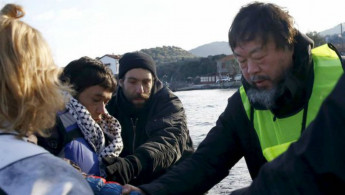China's Ai Weiwei pulls works from Denmark
Ai announced on social media Wednesday that he no longer wanted to have his works on display at the Aros museum in Aarhus and the Faurschou Foundation in Copenhagen.
Curator Jennie Haagemann told AP that Ai called the owner of the Faurschou Foundation to inform him of his decision.
Aros museum officials said they didn't know anything beyond what Ai had posted on Twitter and Instagram.
Museum director Erlend Hoeyersten said he has "great respect" for Ai's criticism of Danish immigration policies, "but I also find it unreasonable that an entire people is punished for the government's policies."
Ai Weiwei has been supportive of rights for refugees and established a studio on the Greek island of Lesvos, an arrival point for tens of thousands searching for a better life in Europe.
Many others were outraged by the decision that was finalized in the Danish Parliament yesterday, even calling for boycotts and saying that they would no longer travel to the country.
— gordon kinsella (@gordonkerfuffle) January 14, 2016
" style="color:#fff;" class="twitter-post-link" target="_blank">Twitter Post
|
Twitter users felt that Denmark could do far more to help those fleeing war and persecution.
— Kareem Shaheen (@kshaheen) January 27, 2016
" style="color:#fff;" class="twitter-post-link" target="_blank">Twitter Post
|
— Sherif Elsayed-Ali (@sherifea) January 27, 2016
" style="color:#fff;" class="twitter-post-link" target="_blank">Twitter Post
|
— Migrants Rights Net (@migrants_rights) January 26, 2016
" style="color:#fff;" class="twitter-post-link" target="_blank">Twitter Post
|
Many likened the plans to the confiscation of gold and other valuables from Jews by the Nazis during the Holocaust.
— Dr. Anna Scott (@annascottpiano) January 27, 2016
" style="color:#fff;" class="twitter-post-link" target="_blank">Twitter Post
|
— Khan Farooq (@Khan_Kent) January 27, 2016
" style="color:#fff;" class="twitter-post-link" target="_blank">Twitter Post
|
Denmark also recently passed laws that would mean refugees need to wait at least three years before applying for family reunification, a move that would keep loved-ones separated for up to five years.
The country was a popular gateway for thousands of refugees attempting to reach neighbouring Sweden, perceived by many to have more liberal refugee laws.
However, the intoduction of passport checks between the two countries has reportedly led to an increase in asylum applications in Denmark.
Agencies contributed to this report.





 Follow the Middle East's top stories in English at The New Arab on Google News
Follow the Middle East's top stories in English at The New Arab on Google News


